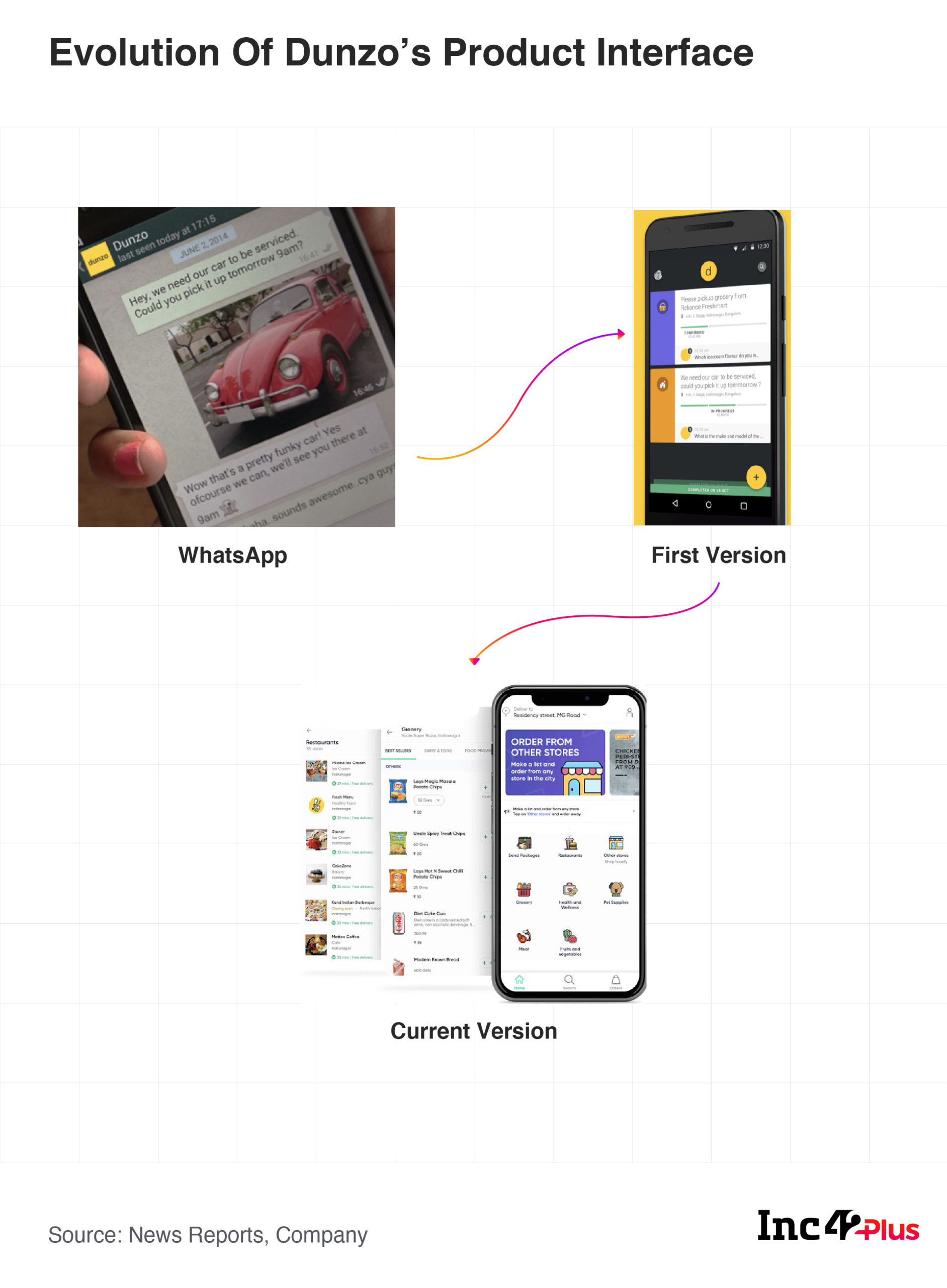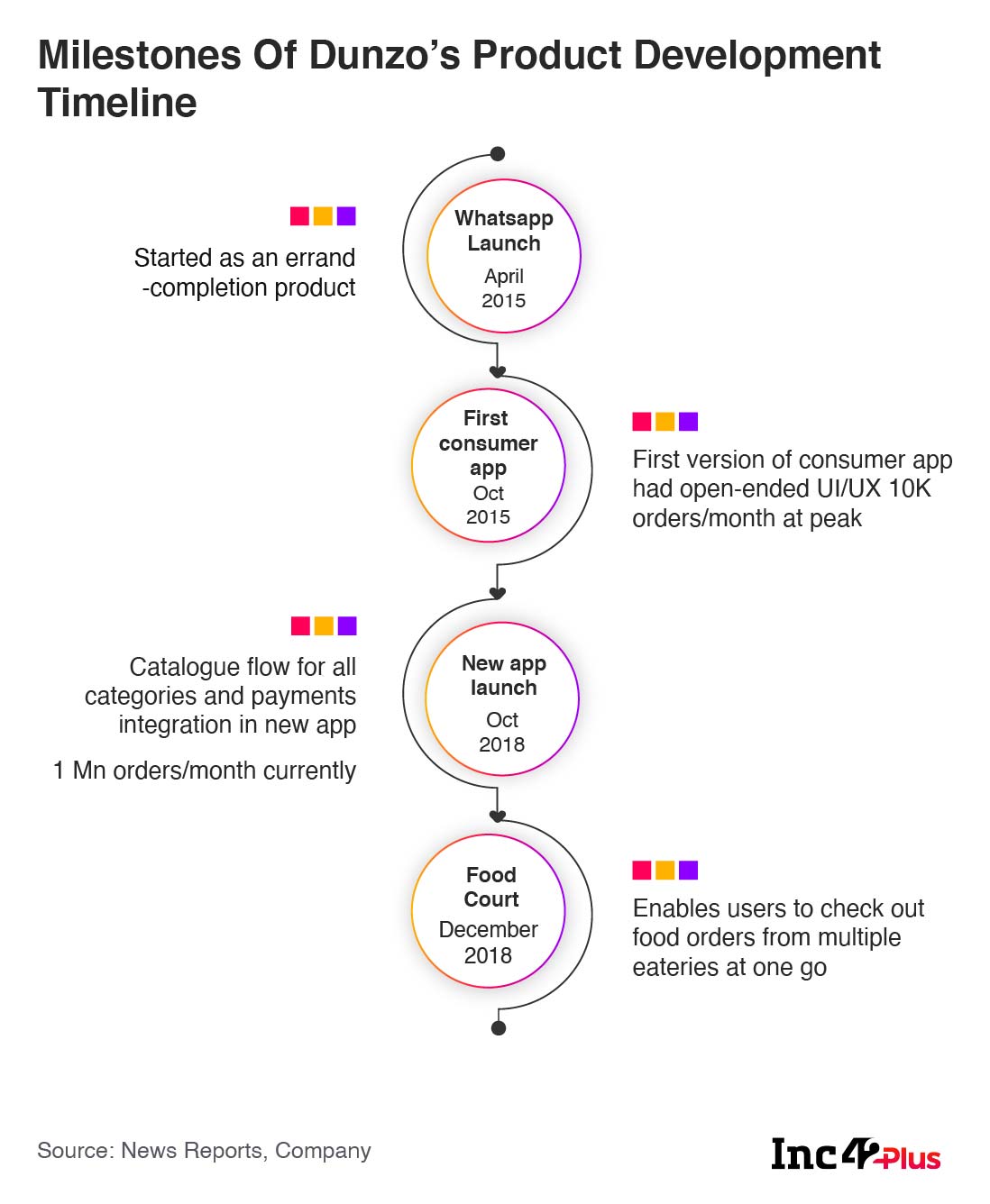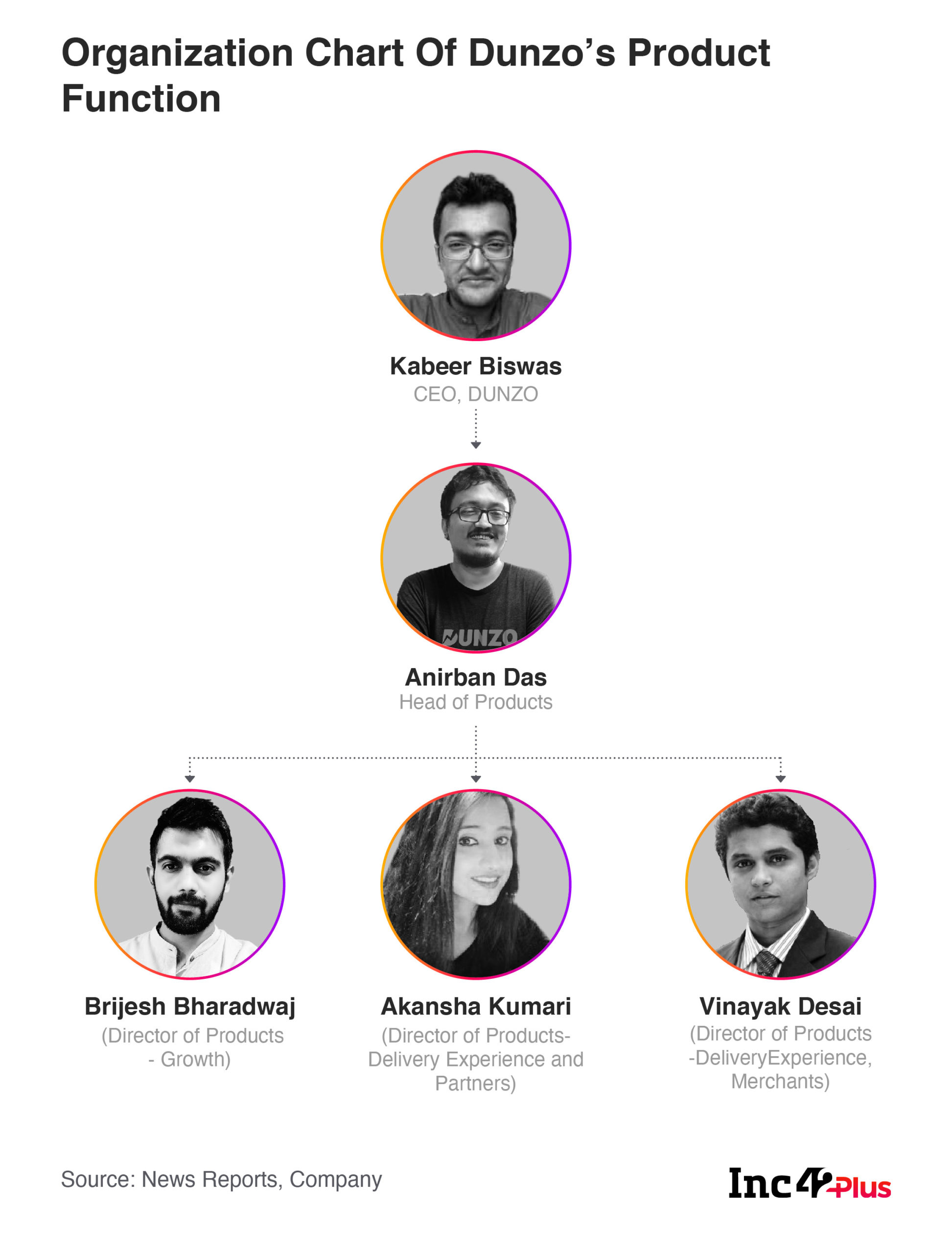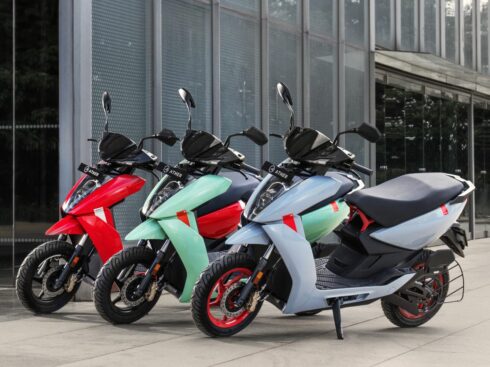SUMMARY
A lot of new users were confused about the open-ended app interface as they were not as tech-savvy as the first group of users who were mostly from the technology circles of Bengaluru, Hyderabad and Pune
To cater to growing customer requirements, the delivery startup has introduced a second version of its app that catalogues food, grocery, snacks and other daily essentials for order placing, and offers point-to-point couriering within a city
Dunzo wants to differentiate itself from food delivery giants Zomato and Swiggy. One interesting way of doing it is to drive customer behaviour at different times of the day with deals and discounts
India’s Product Matrix
How do India’s top product startups ideate, build, test and iterate? This playbook explores through the lens of BYJU’s, Swiggy, BigBasket, Razorpay, Dunzo and ShareChat.
Mukesh Ambani started a funding blitzkrieg by getting Facebook and Google to invest billions of dollars in Jio Platforms in 2020, the pandemic year infamous for plummeting business growth all over the world. That was, indeed, commendable, given the Covid-19 impact on economies and people. But not many are aware that Kabeer Biswas, a former Airtel employee, had been there and done that in 2017.
In December that year, Google invested in his hyperlocal delivery company Dunzo, the first tech startup in India that attracted funding from the search engine giant. It happened nearly eight months after the Bengaluru-based startup launched the first version of its consumer app. It came without many bells and whistles. The simple interface allowed users to list ‘tasks’ which required ferrying stuff from one place to another within the city.
Until then, the delivery startup used to accept orders (tasks, according to Dunzo) on WhatsApp. But with growing traction, the startup realised it would be difficult to scale the product on the Facebook-owned platform.
The Dunzo app V1.0 helped it forge a brand identity and funnel orders to delivery partners more efficiently than before. But user data amply indicated that the company would have to go beyond it to stay tuned to customer requirements.

Developing App 2.0 With Data, Feedback And Intuition
“Although we were a generic, task-based service, we noticed that 95% of that task was happening in four or five categories. For instance, people were sending couriers or ordering food, groceries, medicine and home essentials. And that led us to think. If people are mostly using our services for a few categories, having an open-ended UX (user experience) interface did not make much sense. It would be a lot better if we focus people’s experience on those four or five categories,” says Brijesh Bharadwaj, one of the three directors of product management at Dunzo.
But there was another issue. Several new users were confused about the open-ended app interface. These people were not as tech-savvy as the first lot of users who started using Dunzo through referrals from the tech communities in Bengaluru, Hyderabad and Pune.
Dunzo decided to go for another facelift. This time, it listed a few major categories: Food, grocery, snacks and other daily essentials (for home delivery) besides couriering packages from one point to another. That does not mean a user can no longer place an order for things which do not fall under these categories. The ‘task’ feature has been retained in V2.0, but it is not the first thing that pops up.
The app, in its new avatar, was launched in December 2018. And its immediate benefits excited everyone. New users now understand better what all Dunzo can deliver across its primary categories. Its conversion rate (the percentage of users who complete a transaction on the app after surfing for choices) has gone up two-three times. Customer experience has also improved due to reduction in average delivery time by 10 min as the company focussed on fewer categories.
But all innovations cannot happen based on data. More often than not, metrics do not reveal a customer’s inherent needs and why existing products fail to address those requirements.
Take, for instance, the Food Court feature that has been recently added to the app. It enables users to order food from multiple eateries and pay for everything with a single checkout. Undoubtedly, this is a hassle-free way of ordering as a user does not have to complete a transaction for each order and make a separate payment.
But instead of depending on data-based insights, Dunzo developed this feature based on intuition and customer feedback. The first has come from the harrowing experience when a group orders food and each person wants specific items which may not be sold by a single outlet. Customers also complain about paying multiple delivery fees even though they have ordered food from different eateries in the same locality. Of course, data cannot reflect customers’ pain point in such cases as only 10% of the orders, placed in quick succession by a user, indicate a group situation.

The Metrics Which Matter In Hyperlocal Delivery
Developing features to solve customers’ problems is the core function of all tech product startups. But they also need to keep track of crucial product metrics which drive business outcomes.
For a hyperlocal delivery company, the North Star metrics which need to be tracked are user growth and customer retention in a particular area. If user growth is not happening at a certain pace, the business is not likely to break even as the margins are razor-thin and delivery costs are high. Again, low customer retention means it will be difficult for the company to recover customer acquisition costs, including marketing expenses and discounts.
In December 2019, Dunzo once again came under the spotlight for rolling back its services from certain areas in Bengaluru, Mumbai, Gurugram and Noida. The company had struggled to reach a certain number of customers that could have put it on the path to profitability in those geographies.
“You need to grow to a certain density within a city to drive efficiencies regarding how you do deliveries and how you negotiate commissions (with merchant partners). But all these factors work out only at a certain scale. If you are not doing a certain number of orders in a city, you will not be able to drive cost efficiencies,” says Bharadwaj.
In the first four years of its operations until 2019, Dunzo exclusively focussed on entering new cities, onboarding more users and retaining them using marketing dollars. However, its focus squarely shifted to unit economics in mid-2019. This came on the back of FY2018-19 results when revenues stood at INR 3.5 Cr, but its marketing and promotional expenditures grew 6.33x to INR 24.69 Cr from INR 4.18 Cr in the previous financial year.
Dunzo’s subsequent exits from certain geographies happened as it could not generate the number of orders required to become unit economics positive. When Dunzo, or any other hyperlocal delivery startup for that matter, enters a new city, it initially focusses on user growth and customer retention to reach a specific order density. When the company hits that magic number, the focus shifts to managing the economics and customer retention — a balance that is often difficult to strike.
“When long-term retention happens, users stick to the platform. We have early indicators of that. When I look at how many users have placed their first orders within seven days of signing up (activation) and then see month 1 retention and then month 3 retention, it becomes quite clear. I may have just 1,000 early customers in an area, but if I can see a good trend on these early metrics, I will pour more marketing dollars and grow that area to a point where I can eventually make money at scale,” says Bharadwaj.
How The Product Team Evolved
What is clear at this point is: Hyperlocal delivery business is quite complicated with too many moving parts, including growing customers, retaining them, evaluating areas, optimising economics, managing merchant commissions and delegating delivery partners.
So, the product team has its task cut out. It must keep a tab on building new features and also track metrics in multiple areas to catch signals which indicate what may come next for the business. It also means unlike many other tech startups where product teams have fixed mandates for a year with established objectives and key results (OKRs), Dunzo’s product function has to be more agile. The team has to be restructured every six months or so depending on business realities.
Dunzo has adopted this style of functioning since mid-2019. Before that, the company solely focussed on achieving growth. Its product function was split into three segments — the user side, the merchant side and the delivery partner side. Each took care of its designated business area until the basic product infrastructure was in place without any operational hiccup.
Now, the requirements have changed. With business objectives getting more nuanced, Dunzo’s product functions are organised around specific problem statements. For example, there is a team that only takes care of the company’s growth in Bengaluru. Another is responsible for post-order customer experience, including ETA communications, accurate order tracking, customer support and other related areas. Apart from these squads which deal with short-term objectives, a team also builds and tests features with partners like Google, thus focussing on a longer, strategic horizon.
“These teams include product managers, designers and engineers, but there is no fixed size here. The team size varies based on how much progress we want to make in the next six months and how much headroom we have in terms of what we will be able to build,” says Bharadwaj.
Currently, the growth and delivery experience teams are the largest ones. The experiment team is small as it is developing features which may or may not work. So, this group is optimised for speed while the other two teams are optimised for delivering customer value.

Managing Product Strategy To Drive Value
On the face of it, customer-facing functions may sound hassle-free and straightforward. But predicting value propositions which work for customers is not an easy task. And Dunzo’s product team falters now and then much like other companies.
Here is a case in point. In 2019, the delivery startup tried to include smartphones as a category because online electronics shopping offers bigger margins, and customers increasingly prefer to buy handsets online. But the company soon realised that the category was not a hit among its users. The reason: People rarely want to buy and get a phone delivered within an hour. However, mobile accessories like chargers and audio jacks did well on the platform as these are often required urgently.
“You have to look for a (consumer) value proposition that derives value from an instant delivery network. Our entire value proposition is that we can do it within a few hours. So, we have to find categories, which derive a lot of value from getting something delivered fast. For example, gifting is a great category because typically, you are about to leave for a friend’s house and need the gift delivered at the earliest,” points out Bharadwaj.
But these are what he describes as ancillary use cases which Dunzo fits in during the lean hours when the demand for its main categories is low.
For Dunzo, the biggest category is grocery, followed by courier delivery. These two fit together quite well as people want home essentials like milk, bread and other grocery items from early morning until lunch and then again after returning from work late in the evening. Meanwhile, the afternoon slot sees personal couriers and B2B packages pick up the pace.
Another critical factor that the company has to keep in mind regarding categories is that it must not go overboard with food deliveries as peers like Swiggy and Zomato are already well-positioned in that segment. To put their market dominance in perspective, a look at the numbers will help. When Dunzo was reportedly delivering 2-3 Mn orders per month in 2019, the food delivery giants were clocking 1.2-1.6 Mn orders per day. Of course, Covid-19 lockdowns in 2020 did catapult the numbers. But there is no reason to believe that the differential between them and Dunzo will change dramatically.
Understandably, Dunzo wants to operate mostly across its key categories to differentiate itself from the food delivery duo. One interesting way of doing it is to drive customer behaviour at different times of the day with discounts and deals for various categories.
“I do not want a spike in dinner deliveries as I already have my grocery category spiking between 7 and 9 pm. I would ideally prefer not to have dinner for orders. But I want to play in the lunch food segment because I can take in more orders then. I also want to create a category that is peaking between 4 and 7 pm because that is again a slot when I have a low-utilised delivery capacity,” says Bharadwaj.
Understandably, Dunzo will struggle to decipher what to deliver, when to differentiate itself from other players and how to optimise its delivery fleet’s operations. But equally important will be achieving scale. It must generate 15-17 Mn monthly transactions to become profitable at the company level, says CEO Biswas. Its ability to balance these two critical objectives will determine if Dunzo can deliver the goods in the long run.



























